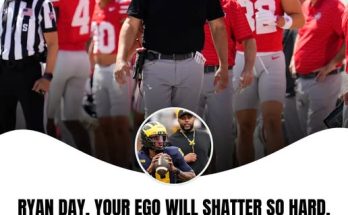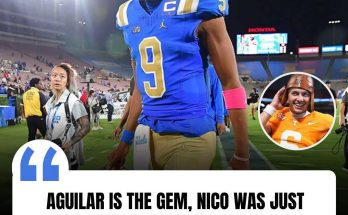When a player signs a massive extension in the NBA, the headlines almost always focus on the number. That’s understandable. Numbers like $287 million practically leap off the screen. They shock, they dazzle, and they often provoke endless debate among fans and analysts alike about whether the player is “worth” that amount. But every now and then, there’s a story buried within the transaction that transcends basketball — that reminds us that behind every stat line is a human being with a family, with struggles, and with dreams that go far beyond a hardwood court. Jalen Williams just gave us that kind of story.
The Oklahoma City Thunder forward agreed to a $287 million contract extension, a staggering number by any measure. And yes, he’s earned it. A do-it-all player with a smooth handle, polished offensive game, and elite defensive instincts, Williams has quietly become one of the Thunder’s most reliable stars. He doesn’t always generate the loudest buzz in a league filled with high-flying dunkers and stat-sheet stuffers, but what he brings to the table is irreplaceable. It’s consistency. It’s leadership. It’s grit. And it’s versatility.
Yet for all the talk about PER, efficiency, defensive win shares, and salary cap implications, none of that is what truly moved Jalen Williams. When he spoke after signing the deal, his most heartfelt moment had nothing to do with his own future or accolades. It had to do with his parents. His simple yet powerful statement captured what every child dreams of saying one day: “I mean, it’s cool, I’ve been fortunate enough to retire my parents.” That’s the quote that matters. That’s the kind of legacy that goes beyond basketball.
His parents — both of whom are proud veterans of the United States Air Force — sacrificed not just time and money, but also parts of themselves in service to both their country and their family. The military lifestyle is not an easy one. It involves long deployments, unpredictability, rigid discipline, and the constant anxiety that comes with serving under dangerous conditions. It also means uprooting your life frequently and dealing with the emotional toll that such a lifestyle demands.
Military families know this struggle all too well. Children of service members often grow up learning resilience early. They develop emotional intelligence quickly, not out of luxury but out of necessity. Jalen Williams’ rise wasn’t born from ease. It came from seeing two parents live with purpose, commitment, and a drive to overcome adversity. And in many ways, those same values are what molded him into the type of basketball player — and man — that he is today.
What makes Williams’ story even more compelling is that it highlights the seldom-discussed reality that NBA success isn’t just about the player — it’s about the ecosystem that supported them. The parents who drove them to early-morning practices. The mentors who corrected their form and helped them understand the mental aspects of the game. The siblings who played defense against them in the driveway. The coaches who held them accountable. The friends who encouraged them after losses. That circle — especially in Jalen’s case — was fortified by the Air Force discipline his parents instilled.
Financial independence is one thing. But using that independence to bring peace and joy to the very people who sacrificed everything for you? That’s another level of fulfillment. While many young athletes splurge on cars, homes, and designer fashion — and make no mistake, Williams is more than entitled to enjoy his wealth — it speaks volumes that his first public reflection was about his parents. There’s something poetic about that.
And this moment also touches on a larger societal issue — the lack of support many veterans receive after completing their service. In many cases, veterans return to civilian life facing significant challenges, from healthcare access and job placement to mental health support. To see an NBA player consciously ensure that his veteran parents not only have stability but can now live comfortably and happily in retirement is a powerful gesture. It is, in many ways, a reversal of the generational struggle that has plagued too many families. It turns the narrative from survival to celebration.
Think about the emotional layers of that moment. For his parents, watching their son accomplish something so rare and then choose to use that platform to honor them must be overwhelming. In their military careers, they served with little fanfare. There were no standing ovations in arenas. No million-dollar bonuses. No crowds wearing jerseys with their names on the back. But in that single gesture — that simple line from Jalen — they received a kind of recognition that speaks louder than awards ever could. It was their son saying, “I saw everything you did for me. And now it’s your turn to rest.”
There’s something inherently humble about Jalen Williams. Even when he was making his way up the NBA ranks, he was never the loudest player in the room. He didn’t need to be. His game did the talking. Drafted 12th overall out of Santa Clara — a school not often associated with producing lottery picks — Williams has defied expectations at every turn. From scouts questioning his competition level to doubts about whether his game would translate to the speed and physicality of the NBA, he’s proven critics wrong not with brash words, but with steady production.
In OKC, he found the perfect environment. The Thunder, a team built on youth, patience, and culture-first mentality, allowed Jalen to grow without pressure. They didn’t rush his development or throw him into the fire too soon. Instead, they let him integrate organically with teammates like Shai Gilgeous-Alexander, Chet Holmgren, and Josh Giddey. In that ecosystem, Williams not only thrived — he became essential.
And while $287 million is undeniably life-changing, it’s important to contextualize what makes that money meaningful. In a world obsessed with material wealth, the more profound impact of this deal isn’t what Jalen can buy, but what he chose to invest in: family. He didn’t talk about buying a private island. He didn’t talk about launching a fashion brand. His mind went straight to his parents. That tells you everything about his values.
This also sends a powerful message to younger athletes coming up: success isn’t just measured in possessions. It’s measured in impact. Every young hooper dreaming of the NBA likely has fantasies of making that first million, signing that shoe deal, and living lavishly. But here’s a player on the other side of that dream who’s showing that the real reward isn’t the fame or the flash — it’s giving back to the people who made your dream possible in the first place.
Moreover, his story helps debunk the dangerous myth that athletes are disconnected from the world around them. We often see NBA players portrayed through narrow lenses: flashy lifestyles, social media antics, or on-court altercations. But for every viral moment, there are dozens of quiet gestures like Jalen’s — players donating to schools, starting scholarships, building homes, and, yes, retiring their parents. These stories deserve just as much airtime.
Let’s also consider the psychological freedom this move gives Williams. By ensuring his parents are taken care of, he removes a major emotional weight that many people in their twenties and thirties still carry — the need to support family members financially. That’s not a burden, necessarily, but it can be a source of stress. Now, Jalen can focus entirely on his career, personal life, and mental well-being, knowing that his family is secure. That peace of mind might be the best investment of all.
Jalen Williams’ gesture could also become a blueprint for how franchises build culture. When a player is grounded in values, shows loyalty, and elevates the people around him, he becomes more than a star — he becomes a cornerstone. The Thunder clearly see that in him. They’re not just paying for his ability to score, defend, or pass. They’re investing in the man. The kind of man who leads by example, who takes care of his own, and who understands that leadership starts at home.
For those who don’t follow the NBA closely, this might seem like just another feel-good story. But for people who understand the grind, who know what it takes to rise from relative obscurity to the pinnacle of your profession, it’s deeply moving. It’s a story of full-circle triumph — one that proves the American Dream, while difficult and often unequal, is still alive in moments like these.
What makes this story even more enriching is how it plays out across generations. Jalen’s parents, products of an institution rooted in service and discipline, passed on those very values to their son. And now, in a world where fame and fortune can distort priorities, their son has mirrored that sacrifice in a different way — by giving back instead of taking more. That’s how generational values work. Not just through words, but through action.
This isn’t a moment that fades in a day or gets lost in a highlight reel. Years from now, when Jalen Williams eventually retires from the NBA, people will remember the way he played, the games he won, and the stats he racked up. But his family will remember this moment. The day he took a pen, signed a contract, and changed the course of their lives — not for himself, but for them.
It’s easy to be jaded by money in professional sports. The numbers keep growing. The contracts seem detached from reality. But then a story like this comes along and reminds us of the humanity behind the headlines. Of a young man who looked at $287 million and saw more than luxury — he saw freedom for the people who gave him everything. And that, as Jalen Williams himself might say, is the best part.



